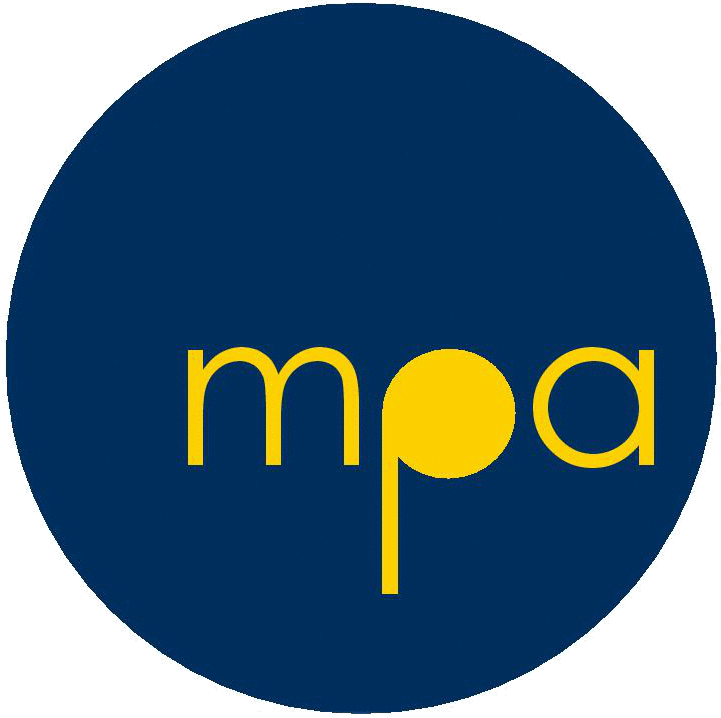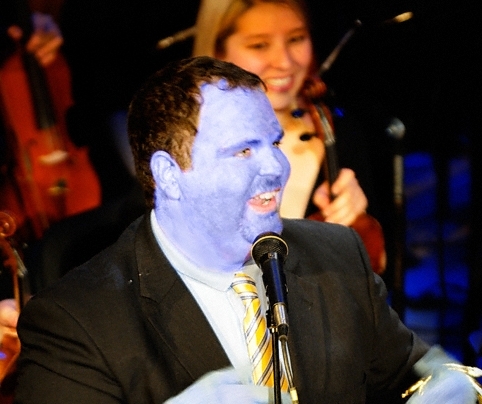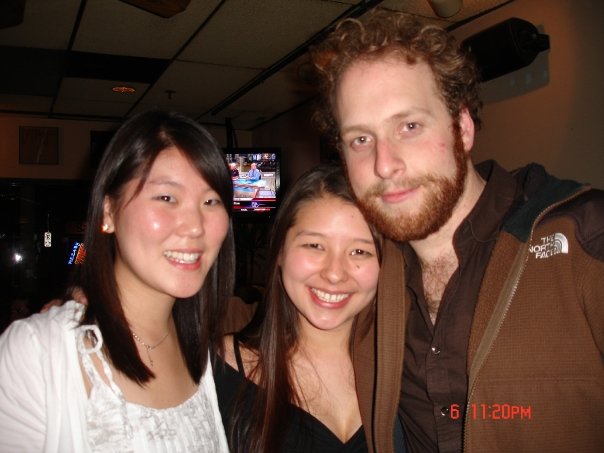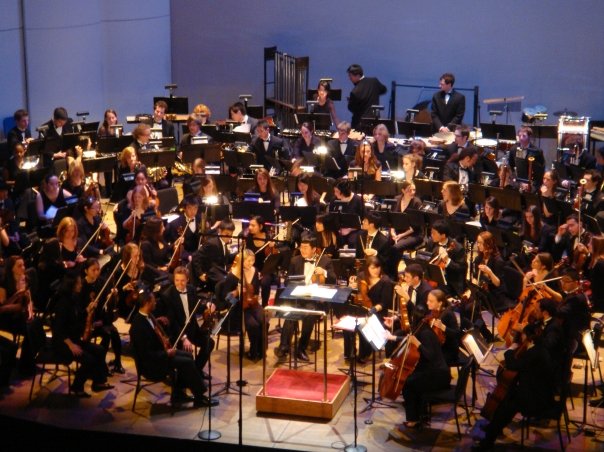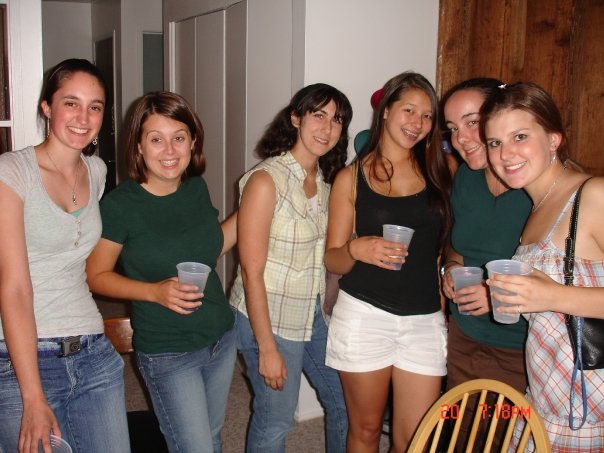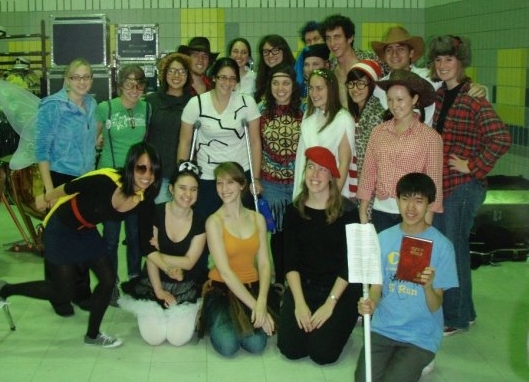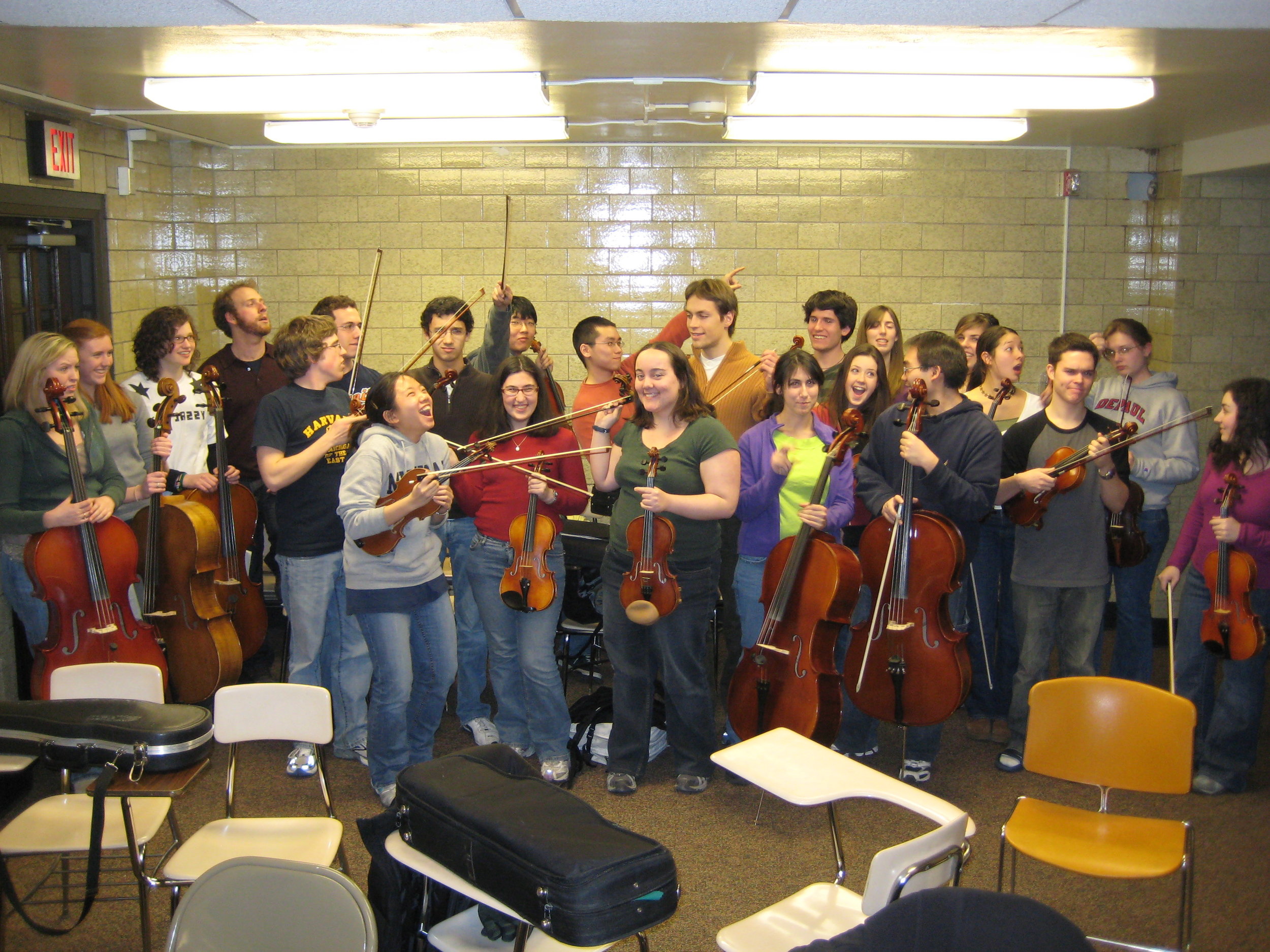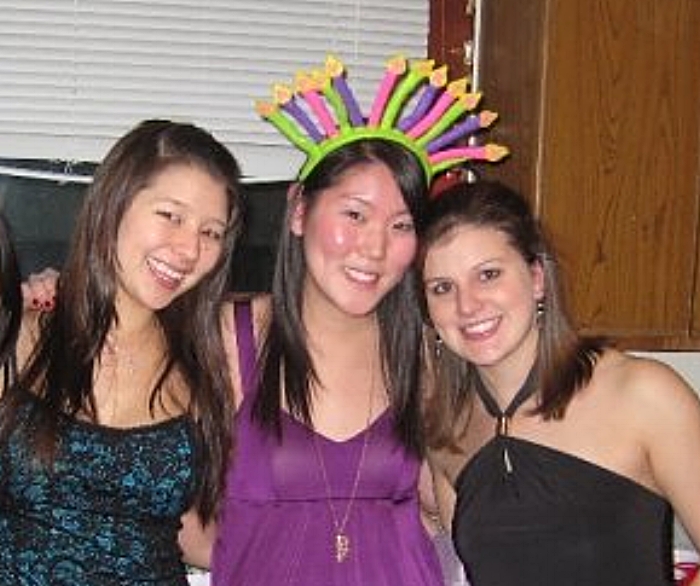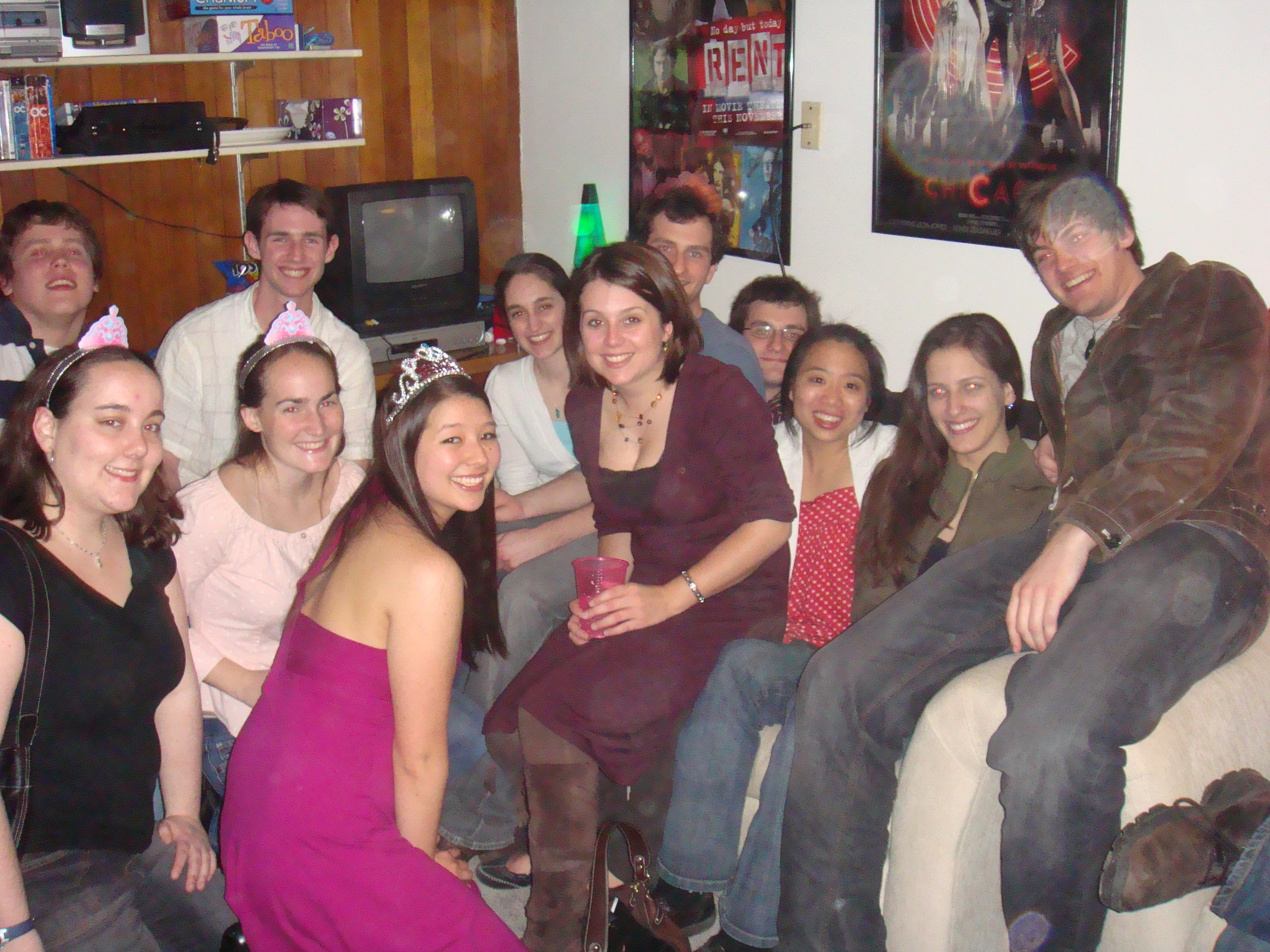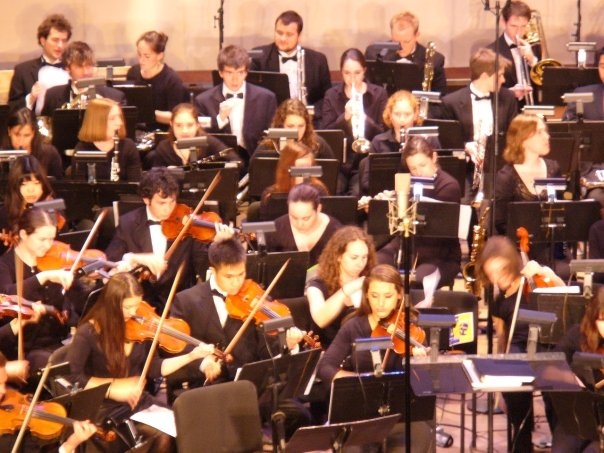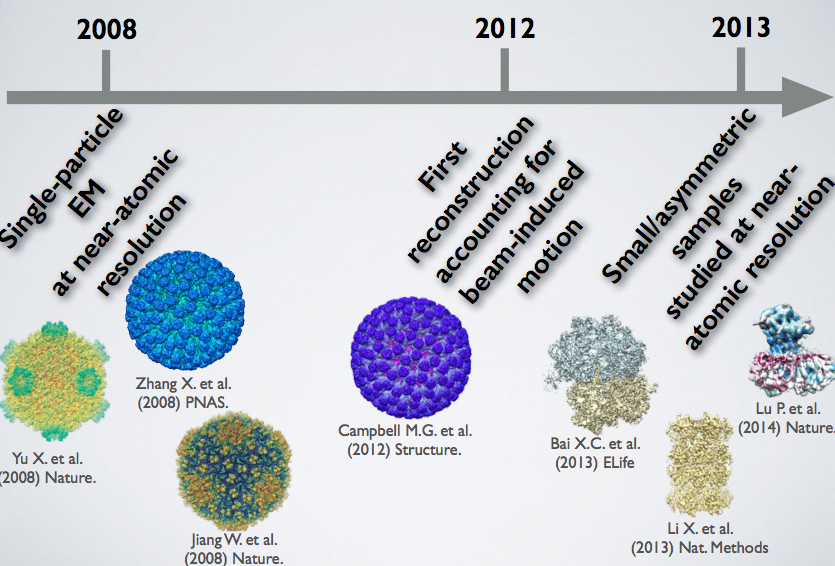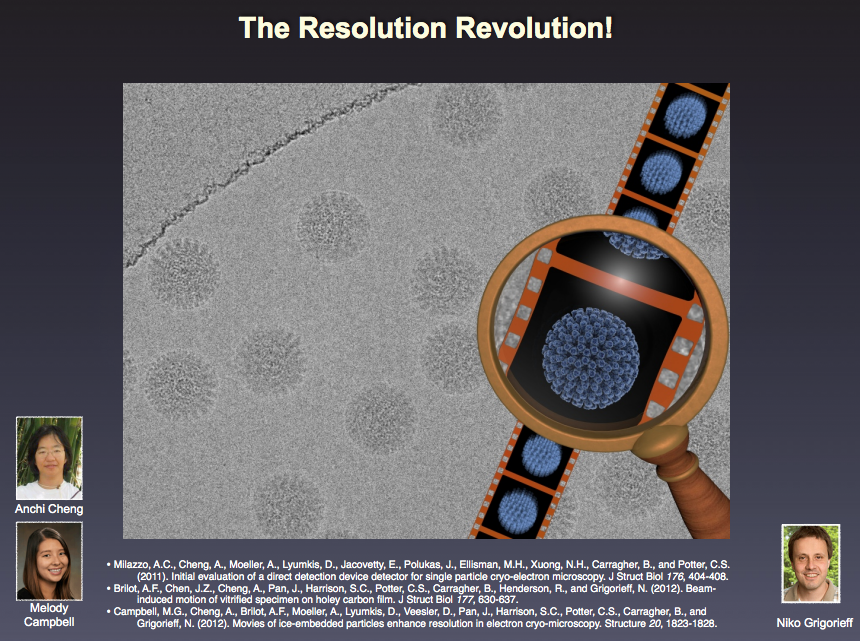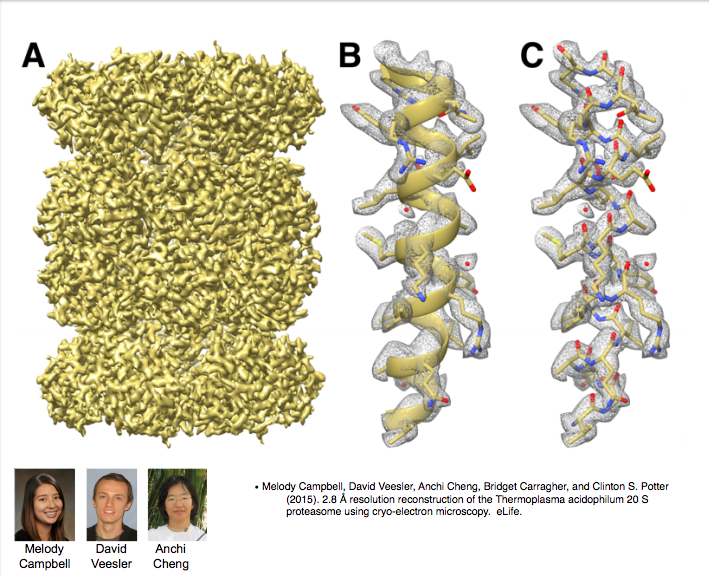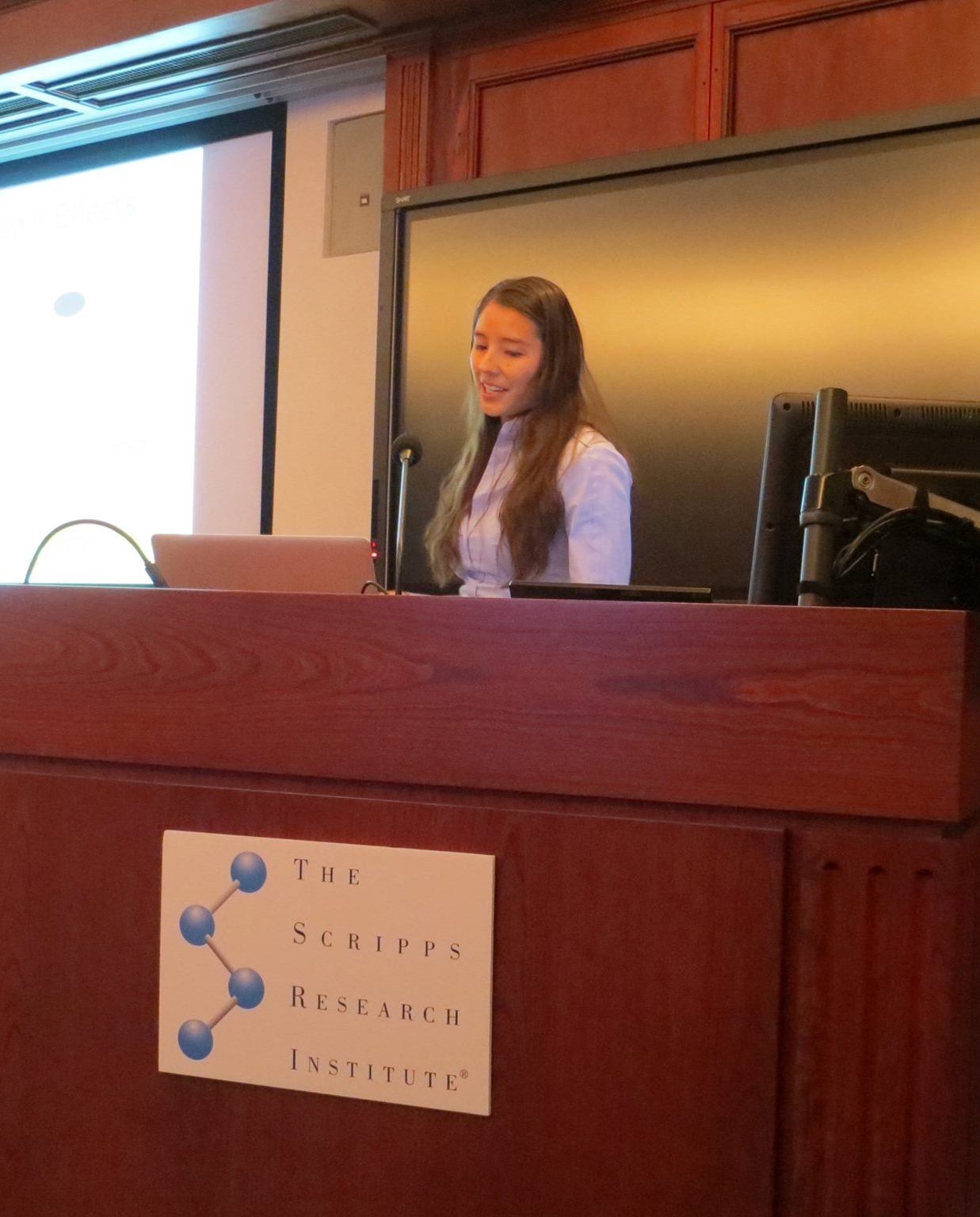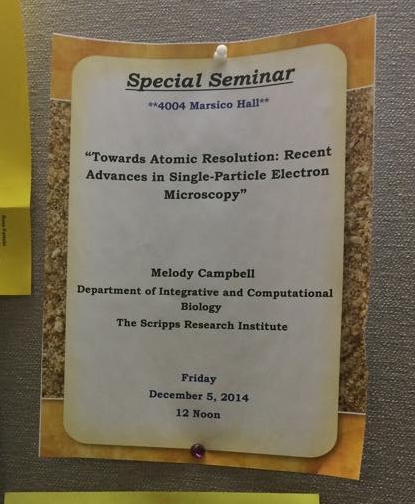DR. MELODY CAMPBELL,
DISCOVERING WHAT BINDS US TOGETHER
CURRENT POSITION: Postdoctoral Research Associates at UC San Francisco
LOCATION: San Francisco, California & Seattle, Washington
UNIVERSITY OF MICHIGAN DEGREE: BA in Biochemistry with minor in German (University of Michigan), PhD in Biophysics (Scripps Research Institute)
GRADUATION YEAR: 2010
ACTIVITIES AT MICHIGAN: American Chemical Society Student Affiliates; Alpha Chi Sigma; independent research in the Koreeda lab; independent research in the Karbstein lab; being in the library
MICHIGAN POPS ORCHESTRA INSTRUMENT: Violin
Listen to one of Melody's favorite Pops pieces while you read about her Pops Life!
A CONVERSATION WITH MELODY
KELLY COMPTON, our Pops Life correspondent, talks with Melody about how she went from the research labs of Michigan to being cited by the 2017 Nobel Prize winners of Chemistry, and how her experience with the Pops still shapes her work today.
KC: Melody, tell us a bit about your musical background before coming to Michigan
MC: Obviously with a name like Melody, I was predisposed to do music. Both of my parents were musicians, and I started playing when I was between 4 and 6 years old. My older brother had started before me, so I inherited his old violin. I did Suzuki in elementary school, quartets and chamber orchestra in middle school, and I played throughout high school. It seemed natural for me to continue in at least some capacity when I got to college.
KC: What drew you to the Michigan Pops Orchestra?
MC: I already knew I was going to audition for Pops when I got to Michigan because my roommate was already in it. Carolyn Nishon was kind of a legend in Pops, and she had gone to Okemos, so on some level everyone in the Okemos orchestra going to Michigan knew about Pops.
KC: What are some of your favorite memories of being part of the Pops?
MC: I was in one of the movies! I think it was for the “Pops in Love” concert. I don’t remember what the premise of it was, but I know that it involved Yaniv and I falling in love at the zoo. That whole day we ran around the zoo with a camera crew, and that was totally out of my comfort zone. I had never done anything with filming before, and I remember it being so funny! I can’t imagine how red my face must have been when the movie played on that huge screen behind us in the concert. I still can’t believe I had the courage to do that.
Another one of my other favorite memories was “Scrambled Pops,” where we could sit wherever we wanted in the orchestra instead of just sitting in our section. This allowed us to get a different perspective on who was playing what, and it showed what an orchestra could sound like with everyone sitting all over the place. I'd been in a lot of different orchestras before Pops, but I'd never done anything as fun and whimsical as that in a rehearsal before. It was also just funny. The one thing I learned from that was: Do NOT sit next to the brass.
KC: So you currently live in Seattle… and San Francisco?
MC: My husband’s job is in Seattle; he’s a professor at the University of Washington, teaching Biochemistry. We actually met in the same lab in San Diego, so we do very similar work. We recently bought a house in Seattle, but I work in San Francisco. I live in SF during the week, and every other weekend I’ll fly up to Seattle, and on the rest of the weekends he’ll come here. It’s pretty awful. I love Seattle so much – definitely more than San Francisco.
KC: What is your current job, and how did you get into this field?
MC: This may sound cliché, but science is a way of understanding the world a little better. I started doing independent scientific research the summer after my freshman year in college. I realized then that when you do scientific research, even if it’s a tiny piece of the bigger picture, you have the answer before anyone else. You’re the first person in the entire world to understand exactly how these two molecules interact or what this protein looks like. And it’s usually on a really, really small scale, but having that knowledge that no one else has for a brief moment is very cool.
I’m an electron microscopist, which probably sounds a lot more intimidating than it actually is. Electron microscopy falls under the umbrella of structural biology, which pretty much refers to any technique used to study the structure of proteins or complexes. Electron microscopes are pretty similar to light microscopes in what they do (magnify samples), except instead of using light, they use electrons, which allows for higher resolution images. They are also bigger and a lot more expensive. My work entails trying to understand exactly how certain proteins and protein complexes look. If you understand exactly how a protein looks, you can better understand how it functions, how it interacts with other proteins, and what shape molecules might fit in it, which means you can also possibly design better drugs.
In my role, I produce proteins complexes and prepare them such that they can be imaged in an electron microscope (which involves freezing them into a non-crystalline form of ice at about -350 ˚F). I use the microscope and a special type of camera to collect thousands of images of the same protein complex. Although all of these images are in 2D, thorough a series of data processing steps, I can come up with a map of how the protein complex looks in 3D. These data processing steps are not always entirely straightforward and change based on what type of proteins you’re looking at, so some of the work I do has been developing new algorithms to optimize this step. At the end I’ve been able to get 3D models that are so highly detailed you can visualize individual water molecules. After I have a model of the complex, there are more interpretation steps and biochemical experiments I do to confirm any new hypotheses about the structure.
KC: In your work, what are the larger goals that you’re working towards? Do you work on the pharmacology side, are you researching specific molecules for specific diseases, etc.?
MC: This is a bit of a round about answer because I’m going to deflect: The Nobel Prize in Chemistry was just awarded to Jacques Dubochet, Joachim Frank and Richard Henderson for their contributions to develop cryo electron microscopy, which is exactly what I do. As a result, the field is growing at a very fast pace. There is a ton of overlap between people working on the same things, so recently scientists haven’t been talking much about the exact proteins they’re working on so that they won’t “tip off” a competing group to rush and publish their structure first. I work as part of a team so if I speak in too much detail about what I’m working on, it not only affects me, but many of my colleagues as well. I can tell you that I’m working on a small membrane protein that is a promising drug target for chronic obstructive pulmonary disease. (When we get this structure published I’m more than happy to tell the whole story!)
I want to mention that this is something that’s only happened in the past five or so years in the field; people used to speak freely about their work and welcome suggestions from others. Only very recently has it closed up. For my career path, it’s important to publish papers about what you learn. That’s the metric that employers use to determine how successful you are. If another group of scientists publishes the same protein as you first, it’s very difficult to publish a paper about it afterwards. You can think of it as racing to be the first to make a map of a new unchartered island. Once the first map is published with a guide to where all the trails and mountains and lakes are, the second map-- although some small details may be different and maybe even more detailed-- is not nearly as exciting as the first map. It’s pretty competitive right now.
KC: Because your line of work is so competitive, does that make your job stressful at times?
MC: Yes, it makes it very stressful. When I started in this lab two years ago, both of the projects that I was working on “got scooped,” as we call it (like in journalism). I had been working on one protein for a few months, and then I heard that another group had published the structure. I started a new project - I actually worked on that second project for about a year - and then one day its structure was published by another group too. This is really tough and can be disappointing – imagine working on something for a year, and then one day you come in and read a paper and you think, “Oh… everything I’ve done for the past year doesn’t matter.”
I don’t want to sound pessimistic about it, because I learned SO much from these projects. For that second project specifically, I was purifying membrane proteins in human cells, one of the most complicated systems for expressing and purifying proteins, and also one of the most difficult types of proteins to purify. So I certainly learned a lot of new things and techniques, but in the end I don’t have any publications to prove that I did any of that work. As for least favorite things about the job, that’s definitely one of them. I knew that project was high risk when I took it on, but I was really interested in it. I was actually studying CFTR, the protein that causes cystic fibrosis, so there was a TON of interest in that protein. Sometimes if you work on less interesting things it’s less stressful.
KC: What are your favorite and least favorite aspects of your job?
MC: Okay, so I think we thoroughly went through my least favorite aspect, which is the stress and competition. As for my favorite…my PI (principal investigator), both the one I have now and the one I had while getting my PhD, were both very chill. They trust their students and post-docs to be motivated, keep up with the literature, and design their own experiments. That’s been nice, in that I don’t really answer to anyone. If I wanted to do anything wildly expensive or crazy, my PI might step in, but on a day-to-day basis I can come in whenever I want and leave whenever I want. I can take days off. As long as I’m getting work done, it’s fine. I love the flexibility. I don’t want to make it sound like we don’t work a lot, because we work a TON, we just do it on our own schedule. I’m allowed to pursue my own ideas, which is nice. That gives me a sense of independence.
KC: Is that flexibility typical for a lot of lab jobs?
MC: It really depends. Some PI’s are more micro-managing. When I was in undergrad, I did research with a fantastic advisor, but she was definitely more, like… she noticed when people came in and left, she had us write weekly reports, and lots of times she would tell us which experiments to do. That was probably the correct way to manage me as an undergrad – that strict guidance helped me to better make my own decisions later in my career.
KC: What advice would you give students hoping to follow in a similar career path?
MC: Make sure you really want to do it. Michigan is great in that it has a lot of different labs, and the labs are happy to take on undergraduates. That’s certainly not true at every institution. So get yourself into a lab doing independent research as early as possible. When I started at Michigan, I was in an organic synthesis lab for two years. I loved doing it, but I realized I didn’t want that to be my life. So then I moved to biochemistry lab, and I liked that a lot too, but we were collaborating a lot with the structural biology lab, and that’s when I realized, “I like this biochemistry work and could see myself doing this long term, but THAT one sounds even cooler!” I needed the hands-on experience to figure out that I wanted to do this in my career.
If you’re in a lab that you don’t like, then switch. That will also give you experience with seeing different mentoring styles. In undergrad, it’s a lot easier to change which lab you’re in after a year if needed, but when you’re getting your PhD you commit 4-6 years to one lab. I should also mention: You want to make sure you’re doing the science that you like and that you’re with a boss that you like. That’s something that isn’t always talked about as – it’s not just what type of science you’re doing, it’s who you’re working for and with.
Finally, be ready to work really, really hard. Nine to five doesn’t mean anything here – you work whenever you’re awake. So know that if you’re going to do a PhD in science, you have to truly love it.
KC: How did the Pops influence your time at Michigan and after graduating?
MC: While I was at Michigan, it was nice to have an outlet to be able to continue doing music. I was taking a ton of science classes, and it could get really overwhelming, but I always knew that on Sunday I had this fun and exciting thing to do that would take my mind off of everything else.
For the “after graduating” part, one thing that I gained from Pops was being more comfortable on the stage. I now have to give talks about my research findings in front of sometimes hundreds of people, which can be extremely intimidating. Pops helped me become more confident when so many eyes are on me. Well, it either made me become more confident or at least it made me better able to fake confidence. Every single time I have to give a talk, I still get crazy nervous. I have a mini internal meltdown. This may never fully go away though: I was actually talking to my boss about this recently – he flies all over the world constantly giving talks. He said that, according to his Fitbit, every time he gives a talk he can see his heart rate spike, even though he probably gives several a month.
KC: What does the Pops mean to you personally?
MC: Pops is a way of having it all. I was able to do music in undergrad, while still being able to focus on science. It was a way for everyone in the orchestra to maintain the musical tradition in all of the classical music that we performed, as well as modernize it with all of the movie scores and popular songs. It was also a way to blend music with theater and movies and whatever other antics happened onstage. It was bridging EVERYTHING together into one.
MELODY'S FAVORITES
- RACE YOU'VE RUN: Disney Princess Half Marathon (Added bonus: it was on my birthday and since I was wearing a badge, the hundreds of people who passed me running (I'm slow) wished me happy birthday!)
- YOGA POSE: Flying pigeon
- RESTAURANT IN A2 AND SEATTLE: Zingerman's in A2 and Shiro's in Seattle
- ADVENTURE YOU'VE HAVE WITH YOUR HUSBAND: Last year we took trains around Europe (and may have gotten hopelessly lost on our way to the Swiss Alps once). Venice was particularly fun: navigating the city though all of its twists and turns and hidden alleyways (added bonus: adventures are especially fun when they include lots of food).
- CHINESE BAKERY ITEM: Steamed Black Sesame Balls from Begoni Bistro in SF Chinatown
- ROLE MODEL IN RESEARCH: My former advisor, Bridget Carragher. She managed her lab in a way that made everyone feel equal and important and was always very invested in each one of us and in our project. On top of that, she ran a company and raised a family. Not only was she the pinnacle of finding a work/life balance but she also encouraged all of us to find that balance too (often times firmly shoo-ing us out of the lab on Friday nights to stop working and go out and have some fun).
- U OF M MEMORY: Graduation day! Since President Obama was the keynote speaker at my graduation, it came with many additional security measures. I think we woke up around 5am and made pancakes before heading over to Elbel Field. It was still all dark and surreal and we had to check in and get through security at 6:30 in the morning. Then we just had to sit around and wait on the field for hours but it made for an extremely memorable last day as an undergrad. (And obviously, speech: AMAZING).
- THINGS ABOUT LIVING IN SEATTLE: Mountains, coffee, and salmon!
- POPS PIECE YOU'VE PLAYED: I was going to say "Liebestod" but then I realized this is the piece that is used as the audio at the top of the page, and I decided that would give a really weird reading-an-interview vibe, so I pick Raiders of the Lost Ark.
5/1/18
